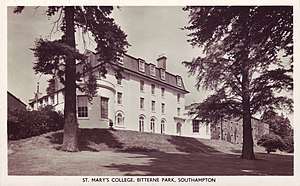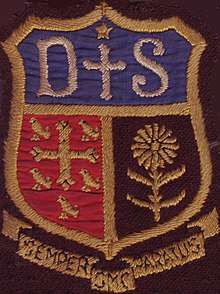St Mary's Independent School, Southampton
St Mary's Independent School, formerly named St Mary's College, is an independent day school for boys and girls in Southampton, Hampshire, England.
| St Mary's Independent School, Southampton | |
|---|---|
 | |
| Address | |
57 Midanbury Lane Bitterne Park Southampton , Hampshire , SO18 4DJ England | |
| Coordinates | 50.9197°N 1.3681°W |
| Information | |
| Type | Independent day |
| Motto | Semper Paratus (Always Prepared) |
| Established | 1922 |
| Local authority | Southampton |
| Department for Education URN | 116567 Tables |
| Gender | Co-educational |
| Age | 3 to 16 |
| Enrolment | 283 |
| Colour(s) | Original : Dark brown, gold 2017 : Dark blue, gold |
| Former pupils | Old Simmarians |
| Website | http://www.stmarysindependentschool.co.uk |
The school is located on the site of a former a country house called Bitterne Grove, built c1790 by Richard Leversuch. In 1910 it was bought by the French order of the Brothers of Christian Instruction and renamed as St Mary’s House. Initially it was a centre for students who were exiled from France due to anti-clerical laws passed there in 1903 and training for the Brotherhood, until the centre was relocated to Highlands College, Jersey, in the Channel Islands.
In 1922 it became the first Secondary School for Catholic boys in Southampton, under the name of St Mary’s College, and opened with five Brothers and 30 pupils.[1] During the Second World War rapid expansion of the school took place; the number of pupils passing from 200 at the start of the War to 400 at the end. In 1992 the junior department started taking girls and in 2000 the senior department was opened to girls, and latterly approximately 25% of the pupils were girls. The schools mission is to 'seek to foster the growth of the whole person within a Mennaisian community'. Former pupils are known as Old Simmarians.[2]
From 1925 to 1964 the school was significantly sustained by the presence of Rev Brother Maurice.[3] Before WWI he had been sent as a teacher amongst the Blackfoot Indians in Montana and Eskimos on the Yukon River. During the war he served with great distinction in the French Medical Corps. He was twice wounded and also mentioned three times in dispatches for gallantry. He was awarded the Croix de Guerre with palm and two stars, as well as the Médaille Militaire and, for his bravery on the battlefield of Verdun in 1916, the Legion of Honour Military Medal. He was twice headmaster of St Mary’s (1928-31 and 1937-43) and later head of its prep-school, Charlton
In 2013 Ofsted judged the school as 'Good'.[4] In 2018 another inspection judged it to 'Requires Improvement'.[5] In 2019 it was reinspected and judged 'Inadequate'.[6]
In 2020 the school went into administration following financial difficulties which had been "significantly impacted" due to the coronavirus pandemic.[7]

Notable former pupils
- Ian Baird, former professional football player and manager
- Nathan Bostock, Chief Executive Officer, Santander UK
- Roy "The Boy" Brindley, poker player, TV commentator, author
- John Burton-Race – Michelin-starred celebrity chef
- Robert Chote, Chairman of the Office of Budget Responsibility
- Richard Deverell, Director of Kew Gardens
- Prof. Anthony R. Dickinson, Professor of Neuropharmacology, UCL
- Mark Eitzel, Musician and composer
- Kevin (Danny) Finn, lead singer with The New Seekers and the group Prima Donna which represented the UK in the 1980 Eurovision Song Contest
- Patrick Garland, writer, actor, theatre and film director
- Philip Hoare, writer, TV programme maker, journalist, Professor of Creative Writing at Southampton University.
- Nick Holmes, former Southampton footballer, FA Cup winning team
- Richard May, a speedway rider who rode for Reading Racers and Poole Pirates between 1969 and 1977
- Andrew Surman, former Southampton and current Norwich City footballer
- John Sydenham, former Southampton footballer
- Sir Gerry Whent, CEO of Vodafone[8]
- Prof. Roger Williams, CBE, Specialist at King’s College Hospital in the treatment of pathological conditions of the liver and Director of the Institute of Hepatology
External links
References
- The original school badge: The upper-half is from the logo of the Brotherhood – Deus Solus/God Alone. The left quartering is from the arms of Edward the Confessor and was used for the English schools of the Brotherhood. The right quartering is the emblem for the school, being a gold (French?) marigold on a dark brown field.
- St Mary's Independent School website. Retrieved 10th May 2017
- Pierre Allory, born 29 October 1984 in St. Malo, Brittany – died 14 January 1988, aged 103, in Josselin, Brittany.
- Seal, John (2013). "St Mary's College". Ofsted. Ofsted. Retrieved 17 May 2020.
- Sanderson, Emma (2018). "St Mary's Independent School". Ofsted. Ofsted. Retrieved 17 May 2020.
- Hubbard, Sarah (2019). "Inspection of St Mary's Independent School". Ofsted. Ofsted. Retrieved 17 May 2020.
- Liddell, Emily (16 May 2020). "St Mary's Independent School, Southampton, in administration". Southern Daily Echo. Retrieved 17 May 2020.
- Cowe, Roger (2002-05-29). "Sir Gerald Whent". The Guardian.